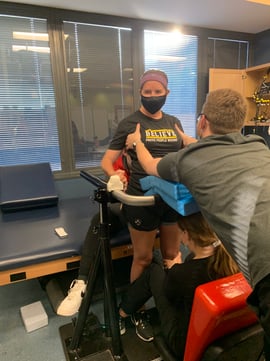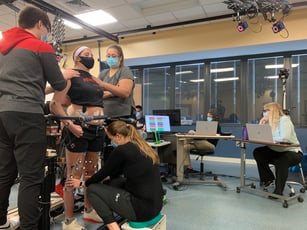 For Denna Laing, waiting was the hardest part.
For Denna Laing, waiting was the hardest part.
When she arrived in Louisville last February, Denna was eager to become a participant in The Big Idea, the groundbreaking Reeve-funded epidural stimulation trial at the University of Louisville’s Kentucky Spinal Cord Injury Research Center. Denna had been fighting to regain function and rebuild her life as quickly as possible since sustaining a spinal cord injury that left her paralyzed from the chest down five years earlier. Now, on the cusp of the trial, after working so hard for so long, she was ready.
But then the unthinkable happened: the coronavirus pandemic swept across the U.S. Denna’s surgery, scheduled for March 17, was cancelled the day before as the hospital stopped elective surgeries and the lockdowns began.
For the next few months, Denna and her mother Jerilyn waited, watching Netflix and Face Timing with family and friends about the news happening outside their window. Denna reread the Harry Potter books and kept in shape by working out on the rowing machine in their apartment. Finally, on June 2, she became the 27th person to receive an epidural stimulator implant at Louisville.
Denna’s first part of the study focused on cardiovascular function and blood pressure regulation. It is an important area of research because low blood pressure affects so many individuals living with spinal cord injuries. Throughout 80 six-hour sessions, Denna monitored her blood pressure and adjusted the stimulator’s intensity to maintain a systolic level between 110 and 120. Without the stimulator, her level would drop to around 90.
 “When the stimulator is off, I instantly feel more tired,” she said. “Sometimes I’ll feel colder, or just in general, a little more lackluster. I definitely feel better when it’s on.”
“When the stimulator is off, I instantly feel more tired,” she said. “Sometimes I’ll feel colder, or just in general, a little more lackluster. I definitely feel better when it’s on.”
Denna recently began her next phase in the study, this time featuring a combination of cardiovascular and standing training. And while the ongoing pandemic makes it a challenge to be so far from her family in Boston, she understands how important these trials are to the millions of people living with paralysis around the country.
“I can see how it would benefit so many people,” she says. “It’s just the waiting. Everyone is sick of waiting. And that’s why it’s really important to get these sessions done and move this trial forward so people don’t have to wait anymore.”

